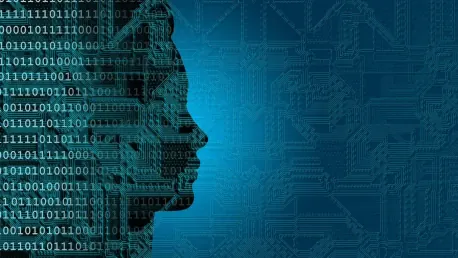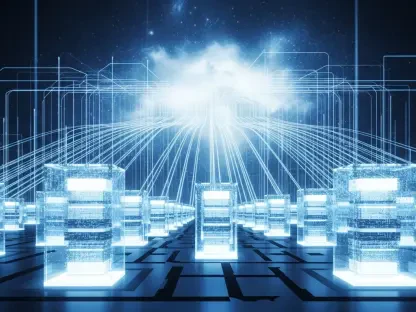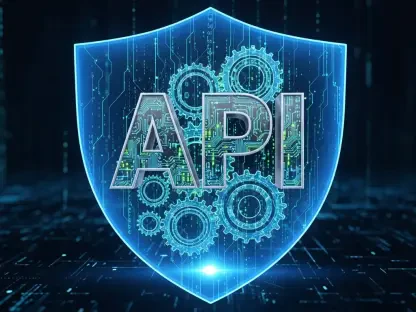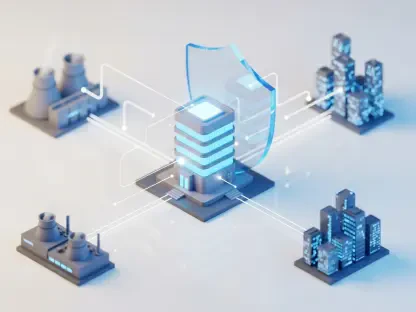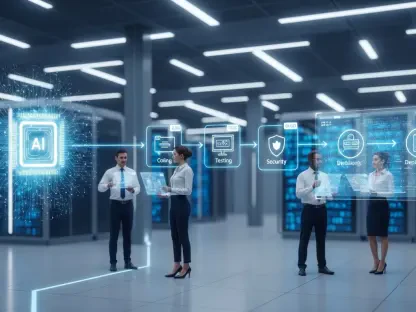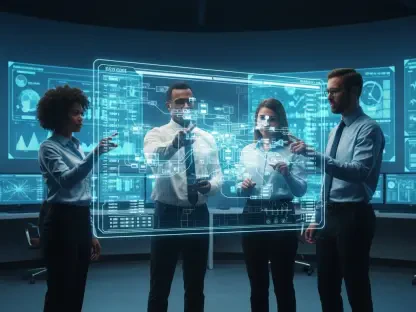The advent of artificial intelligence (AI) has disrupted various sectors, particularly the tech industry, where it has instigated discussions about its long-term effects on job markets, specifically for programmers. Initial trepidations about AI making human coders redundant have gradually given way to nuanced observations. The central question—can AI encapsulate human creativity in coding—remains pivotal as we explore the symbiotic future of AI and human developers.
AI as an Augmentative Tool
AI Enhancing Efficiency
AI has demonstrated significant advancements in generating code, yet its current state positions it as a tool that supports, rather than supplants, human ingenuity. For decades, developers have utilized AI in forms such as code editors with autocomplete features, which enhance efficiency. Modern tools like phpStorm preempt lines of code, exemplifying how AI can amplify coding productivity. These tools, by predicting and suggesting code as a programmer types, not only save time but also minimize simple errors, acting as an indispensable aid in the coding process. AI algorithms can also help identify and prevent potential bugs, thereby improving the quality of the code produced.
However, the efficiency gains provided by AI are just the beginning. With the advancement of machine learning and neural networks, sophisticated AI systems can now assist in more complex tasks such as code reviews and performance optimizations. By learning from vast datasets of existing software, AI can suggest optimizations that developers might overlook, ensuring that the final product is more efficient and robust. These capabilities allow human developers to focus more on the creative and innovative aspects of software development, rather than being bogged down by repetitive and mundane tasks. Despite these advancements, it’s crucial to understand that AI is augmentative rather than transformative in nature, enhancing what human developers can achieve rather than replacing them outright.
Limitations of AI-Generated Code
However, AI-generated code often lacks the intuitive touch of human developers necessary for efficiency and user-friendliness. While AI can handle straightforward coding tasks, it struggles with complex problem-solving and creative design tasks that require a deeper understanding and contextual awareness. For example, AI can generate lines of code based on patterns and data, but it lacks the ability to understand the broader context in which the code will be used, making it less effective in designing user-friendly applications.
Moreover, the creative process in coding is not just about writing functional code; it’s also about innovating and adapting as new challenges arise. AI can follow a set of predefined rules, but it cannot think outside the box to come up with creative solutions to unforeseen problems. This is where human developers have a significant edge. They can think creatively, adapt quickly, and come up with innovative solutions that AI systems cannot yet replicate. This limitation becomes more pronounced in projects that require a high level of customization and personalization, where understanding the user’s needs and preferences is crucial. Therefore, while AI can aid in coding tasks, it cannot replace the creativity and ingenuity that human developers bring to the table.
Human Creativity in Coding
Beyond Technical Proficiency
The often-overlooked aspect of software development is the indispensable role of creativity. Coding transcends mere technical proficiency, encompassing the design of data structures, intuitive user interfaces, and innovative problem-solving. From conceiving ideas in unconventional settings to iterative refining and adapting to challenges, human creativity is the engine that drives effective software solutions. The unique ability of human developers to approach problems from different angles and come up with creative solutions is what distinguishes them from AI.
Moreover, creativity in coding is not just about coming up with new features or functionalities; it’s also about designing software that is user-friendly and intuitive. This requires a deep understanding of user behavior and preferences, which AI cannot yet replicate. Human developers can draw from their own experiences and insights to create software that resonates with users on a personal level. This level of creativity and empathy is essential for developing software that is not only functional but also enjoyable to use.
Innovation in Software Solutions
The creation of the Facebook ‘like’ button is a prime example of how a simple, innovative idea shaped user interactions profoundly. This level of creativity showcases why human developers excel in crafting software that resonates with users on a humane and intuitive level. The ‘like’ button may seem like a simple feature, but its impact on user engagement and interaction has been profound. This kind of innovation is driven by a deep understanding of human behavior and a creative approach to problem-solving, which AI cannot replicate.
Furthermore, creative solutions often emerge from unconventional thinking and lateral problem-solving approaches. For example, the iterative process of refining and adapting software solutions involves not just technical skills but also a creative mindset. Human developers can experiment, iterate, and refine their solutions based on user feedback, ensuring that the final product is both functional and user-friendly. This iterative process is driven by human creativity and is essential for developing innovative software solutions that meet the ever-evolving needs of users. Therefore, preserving and nurturing human creativity in coding is crucial for the continued advancement of software development.
Human Edge and Problem-Solving
Nuanced Understanding of User Needs
Human coders bring a nuanced understanding of user needs and the ability to translate abstract concepts into functional software. The process of conceptualizing complex systems, identifying and solving intricate problems, and adapting to unforeseen challenges is innately human. This human touch is crucial for understanding the broader context in which the software will be used, ensuring that it meets the needs and expectations of its users. AI, while adept at data analysis, often lacks this broader contextual understanding, making it less effective in addressing the complex and nuanced needs of users.
Moreover, human developers can empathize with users, drawing from their own experiences to create software that is intuitive and user-friendly. This empathy allows them to anticipate and address potential issues before they arise, ensuring a smoother user experience. The ability to think creatively and solve problems on the fly is what sets human developers apart from AI systems. This human edge is essential for developing software that is not only functional but also enjoyable to use. By understanding and addressing the needs of users, human developers can create software solutions that truly resonate with their audience.
Navigating Development Complexities
While AI excels in data analysis, it often fails to grasp the broader context and the subtle complexities of user expectations. The indispensability of human problem-solving skills in navigating the ‘messiness’ of software development remains clear, reinforcing the significance of human designers and coders. Software development is rarely a straightforward process; it involves navigating a myriad of challenges and complexities that require creative problem-solving and adaptability. Human developers can draw from their diverse experiences and insights to tackle these challenges effectively, ensuring that the final product is both functional and user-friendly.
Moreover, human developers possess the ability to think critically and adapt to new information, allowing them to quickly respond to changing requirements and unforeseen challenges. This adaptability is crucial for navigating the complexities of software development, where requirements can change rapidly and new challenges can arise unexpectedly. AI, while effective at handling repetitive tasks, lacks this ability to adapt and think creatively, making it less effective at navigating the complexities of software development. Therefore, human problem-solving skills remain indispensable for developing robust and innovative software solutions that meet the evolving needs of users.
Ethical Implications of Coding
Moral Responsibility in Development
With rising software capabilities, the ethical dimensions of coding gain prominence. Human developers have a moral responsibility to consider the societal impacts of their creations, unlike AI, which can replicate biased or inappropriate behaviors seen in examples like Microsoft’s Tay chatbot. The ethical considerations in software development are crucial for ensuring that technology serves humanity positively. Human developers must be aware of the potential consequences of their creations and take proactive steps to mitigate any negative impacts.
Moreover, ethical responsibility in coding involves more than just preventing harm; it also entails actively promoting positive social change. Human developers have the unique ability to consider the broader implications of their work and make decisions that align with ethical principles and societal values. This ethical foresight is critical for ensuring that technology serves humanity positively and does not perpetuate existing biases or inequalities. By prioritizing ethical considerations in their work, human developers can help create a more equitable and inclusive technological landscape.
Ensuring Positive Technology Influence
This ethical foresight is critical in ensuring technology serves humanity positively. As AI becomes more integrated into coding processes, the human role in ethical oversight remains paramount. Human developers must take responsibility for the ethical implications of their work and ensure that their creations align with societal values and promote positive social change. This involves actively considering the potential consequences of their work and taking proactive steps to mitigate any negative impacts.
Furthermore, ethical oversight in coding is essential for addressing issues related to bias and fairness. AI systems, while powerful, can inadvertently perpetuate existing biases and inequalities if not carefully managed. Human developers must ensure that their work promotes fairness and inclusivity, actively addressing potential biases and working to create more equitable solutions. This ethical oversight is crucial for ensuring that technology serves humanity positively and helps create a more just and inclusive society. By prioritizing ethical considerations in their work, human developers can help shape a future where technology is a force for good.
AI as a Force Multiplier
Handling Repetitive Tasks
AI holds immense potential as a force multiplier, handling repetitive and mundane coding tasks. This capability allows developers to divert their focus towards higher-level creative endeavors and innovation. By automating routine tasks, AI can free up valuable time and resources, enabling human developers to focus on more complex and innovative aspects of software development. This shift in focus can lead to more efficient and effective development processes, ultimately resulting in higher-quality software solutions.
Moreover, AI can assist in optimizing various aspects of the development process, from code reviews to performance optimizations. By learning from vast datasets of existing software, AI can identify potential issues and suggest improvements, ensuring that the final product is more efficient and robust. This support can significantly enhance the productivity and effectiveness of human developers, allowing them to achieve more in less time. By handling repetitive tasks and optimizing development processes, AI can act as a powerful force multiplier, enabling human developers to achieve greater heights of creativity and innovation.
Revolutionizing Development Cycles
Enhanced AI-powered tools could revolutionize development cycles, facilitating swifter, more innovative solutions across industries, from healthcare to sustainability. AI’s support in accelerating routine tasks empowers human developers to invest more in groundbreaking projects. By streamlining development processes and automating repetitive tasks, AI can help reduce development times and enable faster iterations. This accelerated pace of development can lead to more rapid innovation and the creation of cutting-edge software solutions that address pressing challenges across various industries.
Furthermore, AI can assist in identifying and addressing potential issues early in the development process, reducing the risk of costly errors and delays. By providing valuable insights and recommendations, AI can help ensure that development projects stay on track and achieve their goals more efficiently. This support can enable human developers to focus on higher-level creative endeavors and drive innovation across industries. By acting as a force multiplier, AI can help revolutionize development cycles and unlock new possibilities for innovation and progress.
Equipping Future Coders
Expanding Educational Paradigms
The integration of AI in coding underscores the necessity to reform educational paradigms. Training should extend beyond technical skills to fostering creativity, critical thinking, and problem-solving. As AI becomes more integrated into the coding process, it is essential to equip future coders with the skills they need to thrive in an AI-enhanced landscape. This involves not only teaching technical skills but also fostering creativity and critical thinking, which are essential for developing innovative solutions.
Moreover, educational institutions must adapt their curricula to include training on how to effectively leverage AI tools and technologies. This training should cover not only the technical aspects of using AI but also the ethical considerations and implications of AI-powered solutions. By providing a comprehensive education that encompasses both technical skills and ethical considerations, educational institutions can prepare future coders to navigate the complexities of the AI-driven world and develop solutions that positively impact society.
Fostering an Innovative Mindset
Preparing students to leverage AI effectively entails cultivating an entrepreneurial mindset that thrives on innovation rather than stagnation. Equipping future coders with a blend of technical and creative skills ensures they can navigate and thrive in an AI-enhanced landscape. This involves fostering a mindset that embraces change and innovation, encouraging students to think outside the box and come up with creative solutions to complex problems.
Furthermore, educational institutions should provide opportunities for hands-on experience with AI tools and technologies, allowing students to experiment and learn through practical application. This hands-on experience can help students develop the skills and confidence they need to effectively leverage AI in their future careers. By fostering an innovative mindset and providing practical experience, educational institutions can prepare future coders to thrive in an AI-enhanced world and drive the next wave of innovation in software development.
Conclusion and Main Findings
The arrival of artificial intelligence (AI) has significantly impacted various sectors, especially the tech industry. This disruption has sparked numerous conversations about how AI will affect job markets, with a particular focus on programming jobs. Initially, there was widespread anxiety that AI might render human coders obsolete. However, over time, these fears have evolved into more sophisticated considerations.
Instead of replacing programmers, AI is now seen as a tool that could augment their capabilities. The crucial question is whether AI can replicate the creativity that human coders bring to software development. While AI excels at analyzing large datasets and performing repetitive tasks, there remains skepticism about its ability to innovate and problem-solve like a human mind can.
Looking ahead, the future of AI and human developers seems to be less about competition and more about collaboration. AI could handle the monotonous aspects of coding, freeing up human programmers to focus on more complex, creative challenges. Therefore, the vision of a symbiotic relationship between AI and developers is increasingly becoming a plausible scenario. As we continue to explore this partnership, it is clear that human ingenuity will still play a crucial role in shaping the future of coding.
